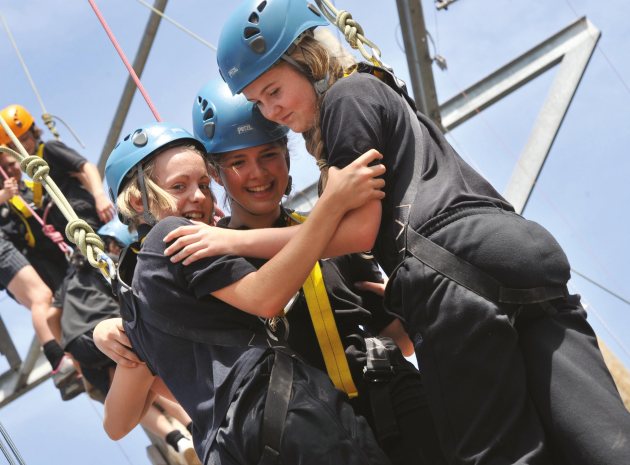The ITV documentary School Swap: the Class Divide, aired during the summer holidays, featured a comprehensive head teacher and three pupils swapping with their private counterparts to find out why such a high proportion of privately educated people end up landing the top jobs in industry and politics. Watching with a chip on my shoulder that comes from being an ex-comprehensive school pupil bought up in a town which boasts one of the country’s top public schools, I was surprised to hear a comment from the public school headmaster which resonated exactly with my own beliefs.
“We put a big emphasis on activities outside the classroom being as important as those within it, like sport, music and drama, we encourage pupils to try new things and this is where their confidence grows,” said Mark Mortimer, headmaster at Warminster School.
As far as Mark is concerned, the thing that gives privately educated pupils the edge is that they leave school genuinely believing they can achieve anything they set their mind to. They have high self-esteem and self-confidence, and learning beyond the classroom plays a far greater part in instilling this self-assurance than what happens within the classroom walls.
A glance at Warminster’s website confirms a comprehensive programme of learning outside the classroom near and far. From sporting, drama and musical opportunities such as performing on the Royal Mile as part of the Edinburgh Festival though to Duke of Edinburgh, European language trips; cultural visits to cities such as Paris, Berlin and Venice; and more adventurous expeditions to places such as Ecuador, Ghana, Morocco and Tanzania, the opportunities are rich and varied and are utilised to build resilience and self-confidence. As much emphasis is put on building character as on achieving good academic results, as this is seen as being a key component of future success.
Breaking barriers
Of course, it isn’t unusual for independent schools to offer such a wide range of learning outside the classroom (LOtC) opportunities. Longer school days mean there is space in the school timetable for innovation, parents are more willing (and/or able) to pay for trips, and many schools employ outdoor learning specialists to deliver activities.
State secondary schools arguably have more barriers to overcome in order to offer such an extensive programme of LOtC. Lack of time in a crowded curriculum, challenges with funding (especially for schools in disadvantaged areas where parents are not able to make voluntary contributions to the costs of visits) and the fact that the school leadership do not see learning outside the classroom as a priority are all oft cited reasons limiting the number of opportunities available to pupils.
It is certainly clear that there is a correlation between the demographics of a school and the number of LOtC opportunities available. Research investigating the variations in provision of out of school learning in secondary schools (Power et al, 2009) revealed that schools with high levels of free school meal eligibility tend to offer fewer LOtC opportunities: “Despite the potential of out of school learning to open up new learning horizons to disadvantaged students, our research suggests that it is the most disadvantaged pupils who will be offered the least inspiring experiences”.
Frustratingly, the pupils who have limited horizons at home, whose families don’t have the means or desire to visit art galleries or go to the seaside, let alone hike up a mountain or visit a foreign (or even their own) capital city, are also less likely to access these experiences at school – to the detriment of their future aspirations.
Excellence in action
However, it doesn’t have to be that way. MacMillan Academy is a state secondary in Middlesbrough with learning outside the classroom provision that would be the envy of the best public schools. MacMillan is the only main stream secondary school so far to achieve the LOtC Mark accreditation at Gold level in recognition of its outstanding LOtC provision, which is fully integrated into the school’s curriculum for all subject areas.
The ‘Bookend Curriculum’ at Macmillan addresses two areas of concern in KS3 – the first half term of year 7 and the last half term in year 9 – by creating six immersion weeks throughout KS3. The year 7 Bookend weeks improve transition by teaming teachers together to deliver lessons based on a common theme with an emphasis on literacy and establishing the generic learning habits students will develop throughout the academy.
The last half term in year 9 has been revitalised through the introduction of Enterprise Week and CaVE week. In Enterprise week students take part in a range of activities such as “Tenner Tycoon” with the aim of developing their entrepreneurial skills. In CaVE (Cultural and Vocational Experience) week students select a CaVE from a wide range of titles such as Computer Games Design CaVe, Adventure CaVE, Bushcraft CaVE, Catering CaVE, or the Lindisfarne CaVE which involved the creation of a media resource to promote tourism on Holy Island. Many of the CaVEs include visits and residential experiences. Students in year 7 and 8 also experience two immersion weeks in each year including Sustainability Week, where students explore the science of sustainability, and Challenge Week where students are asked to compete on a range of physical challenges such as orienteering or Bell Boating and mathematical problem solving activities such as cryptography or “Harry Plotter”. During the Bookend fortnight students in year 10 have a two-week work experience placement. Outdoor Learning is a speciality and all students at Macmillan have access to an after school enrichment programme where they can take part sports, crafts, music, rock climbing, mountain biking and archery from 15:00 until 16:10 Monday to Wednesday. Pupil Premium funding is used to ensure that every student has equal access to enriching LOtC experiences, contributing to MacMillan’s success as one of the most improved schools in the country in terms of the attainment and value-added progress of disadvantaged pupils since 2011.
MacMillan’s success proves that state schools can overcome the barriers and compete with the best independent schools with regard to LOtC.But first the school must recognise the value of learning outside the classroom in improving achievement, supporting personal development and raising aspirations and ensure it becomes a priority and not an add-on. Because it is only in making it a priority and ensuring it is resourced and integrated into the curriculum that the other barriers will be overcome.
Ten reasons for state schools to prioritise LOTC
1. LOtC can raise attainment in all subject areas including maths, English and science.
2. LOtC engages students who are demotivated inside the classroom environment.
3. LOtC improves relationships between teachers and students.
4. LOtC builds self-confidence, resilience and a sense of wellbeing.
5. LOtC improves behaviour and attendance.
6. LOtC enables active learning, develops problem solving skills and deepens understanding.
7. LOtC improves physical and mental health.
8. LOtC broadens horizons and raises aspirations.
9. LOtC enhances spiritual, moral, social and cultural development.
10. LOtC contributes to whole school improvement.
Not convinced? View the evidence at www.lotc.org.uk/why/
ABOUT THE AUTHOR
Elaine Skates is Chief Executive of the Council for Learning Outside the Classroom (CLOtC). CLOtC is the national charity that champions learning outside the classroom and supports schools in offering high quality LOtC for all young people. For free online guidance, information on CPD for teachers and senior leaders and the LOtC Mark accreditation framework visit www.lotc.org.uk









